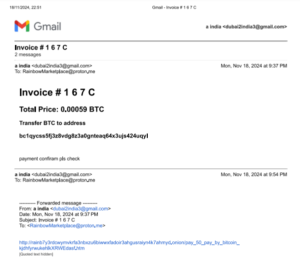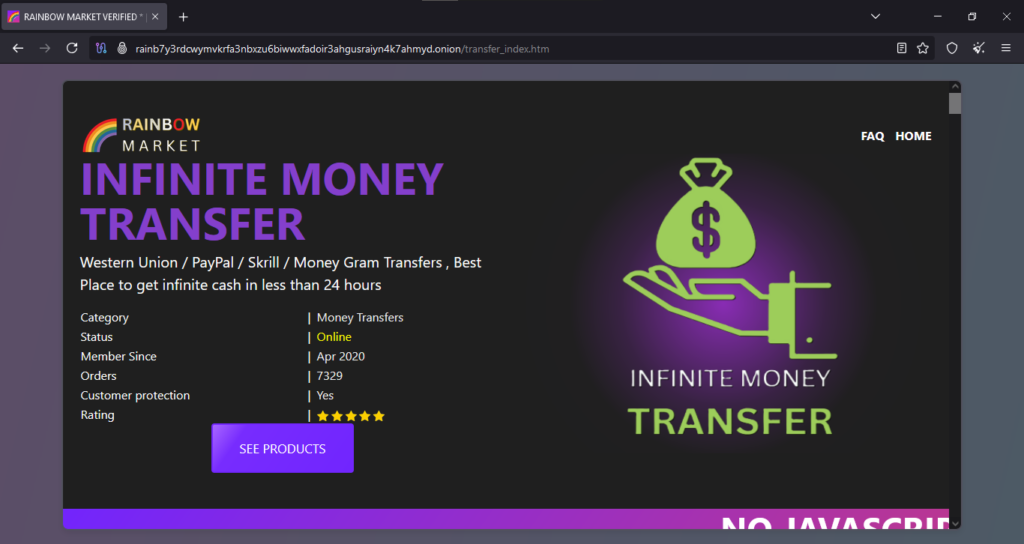Table of Contents
ToggleRainbow Market – TOR Scam Report (114)
Onion Link : http://rainb7y3rdcwymvkrfa3nbxzu6biwwxfadoir3ahgusraiyn4k7ahmyd.onion/transfer_index.htm
Scam Report Date : 2024-11-18
Client Scam Report Breakdown
Original Scam Report :
The client report details a financial loss incurred through a Bitcoin transaction conducted on the Rainbow Marketplace, an underground platform accessible via the Tor browser. The report suggests that the client paid for goods or services advertised on this marketplace, but the promised delivery or service did not materialize. Such scenarios are common in dark web marketplaces, where anonymity, a lack of oversight, and the prevalence of cryptocurrency transactions make them hotspots for fraudulent activity.
While specific details about the transaction—such as the exact nature of the goods or services—are not provided, the mention of Bitcoin and the Tor network points to the inherent risks of operating within such unregulated spaces. The client’s experience underscores the vulnerabilities of users navigating these markets and highlights the challenges of pursuing recourse after being defrauded.
Photos :

Terminology and Definitions
To fully understand the context of the report, it is crucial to define the key terms and concepts involved:
- Bitcoin: A decentralized digital currency that facilitates peer-to-peer transactions without the need for a central authority. Its anonymity and irreversibility make it a preferred payment method in dark web transactions but also a common tool for scams.
- Rainbow Marketplace: Presumably an underground online platform advertising illicit goods or services. Like many dark web marketplaces, it operates outside the purview of legal and regulatory systems, making it a breeding ground for scams.
- Dark Web: A part of the internet that is not indexed by traditional search engines and is accessible only through specialized software such as the Tor browser. The dark web hosts marketplaces, forums, and other sites that often facilitate illegal activities.
- Tor Network: Short for “The Onion Router,” Tor is software that anonymizes internet traffic, allowing users to access hidden websites and maintain privacy. While it has legitimate uses, Tor is also used to access dark web marketplaces.
- Fraudulent Transaction: A transaction where one party (the scammer) intentionally deceives another (the victim) to gain money or goods. In this context, the client sent Bitcoin but did not receive the promised return.
Understanding these terms helps frame the client’s report within the broader landscape of dark web fraud and highlights the inherent risks associated with such transactions.
Scam Analysis and Recommendations
The client’s report illustrates a classic example of dark web fraud, where anonymity and unregulated practices enable scammers to operate with impunity. In this case, the use of Bitcoin and the Rainbow Marketplace reflects a typical pattern: enticing buyers with hard-to-find or illegal goods and services, securing payment via an irreversible method, and then vanishing without fulfilling the order. These scams are rampant on the dark web, where users are often left with no recourse due to the illegal nature of many transactions and the anonymous identities of the scammers.
To mitigate such risks, it is strongly advised to avoid engaging in transactions on dark web platforms altogether. These marketplaces, despite their allure, operate without oversight and accountability, making fraud an inevitability for many users. Additionally, users should exercise extreme caution when dealing with cryptocurrencies, especially in unregulated environments. While Bitcoin provides transactional privacy, it also eliminates avenues for dispute resolution, such as chargebacks or refunds.
For victims of dark web fraud, options for recourse are limited, but reporting the incident to cybersecurity organizations can help build broader awareness and track scam patterns. Public education campaigns about the dangers of dark web marketplaces are crucial for deterring potential victims and reducing the overall appeal of these platforms. Furthermore, leveraging legal, regulated alternatives for online transactions ensures greater security and reduces exposure to fraud.
This breakdown emphasizes the importance of understanding the risks of dark web transactions, recognizing the warning signs of scams, and prioritizing safe, legal online practices. The client’s experience highlights the broader challenges of combating fraud in anonymous digital environments and serves as a cautionary tale for others considering similar transactions.






